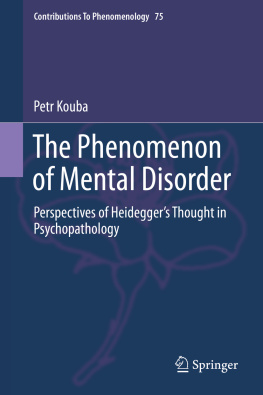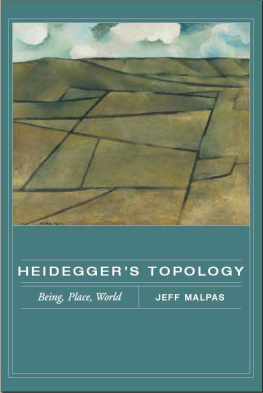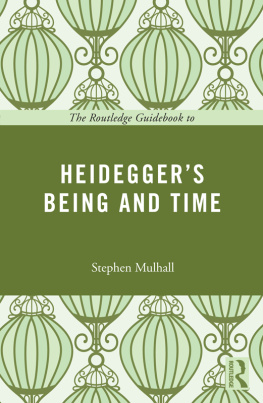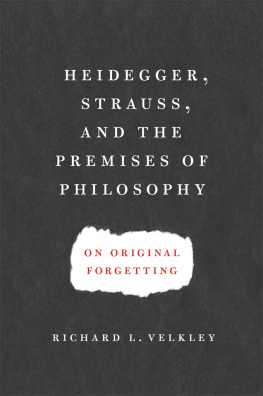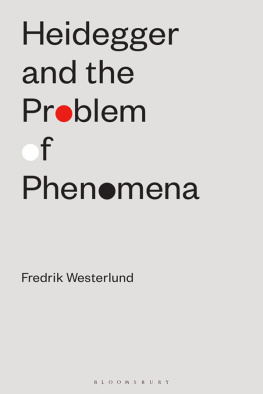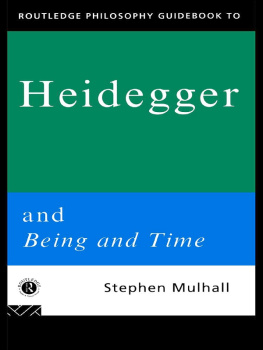1. Introduction
The question of whether Heideggers thought represents the crucial turning point in the history of Western philosophy could in and of itself be a topic for a lengthy discussion. Whatever might be decided on this point, it is nonetheless clear that his thought cannot simply be neglected.
The significance of Heideggers thought can be seen by the mere fact that its influence extends far beyond the realm of philosophy. The extraordinary fame that Sein und Zeit brought upon its author has been followed by the remarkable response it evoked in various specialized disciplines, the most prominent of which are those concerned with the problems of mental health and illness. Numerous psychiatrists and psychotherapists have approached Heideggers philosophy in search of new means of analytical reasoning and, in some cases, for a new basis of medical science as such. Beginning with Ludwig Binswanger, who made use of its terminology in his study ber Ideenflucht only 6 years after the publication of Sein und Zeit , there is a long list of names (including Alfred Storch, Heinz Hfner and many others) whose fame is to some extent connected with the philosophy of being.
A qualitatively new phase of this influence was marked by Heideggers friendship with the Swiss psychiatrist Medard Boss. Thanks to him Heidegger decided to overcome his long-standing reticence about the reception of his work within the field of medicine and to begin interacting openly with medical thought. Especially the records of his Zurich series of lectures and seminars, published under the title Zollikoner Seminare , bear testimony to the arduous search for a common language. There we see him a thinker striving for the most comprehensible explication of the foundational principles of the phenomenological method, facing a committee of medical specialists whose thinking is formed especially through concepts drawn from the discourse of natural sciences. In order to bridge the gap between himself and his audience, Heidegger cannot but launch a critical examination of the primary presuppositions of contemporary natural science. Insofar as scientific rationalism shapes the concepts of health and illness in the realm of contemporary medicine, it is necessary to unmask their artificiality and reveal their underlying intellectual constructs. However, the criticism of the natural sciences does not consist only in a negative evaluation of them. Heideggers critique is in fact primarily constructive, for its goal remains the unveiling of new thematic possibilities and connections. Its task is to mark out a new path to the region of being which is instrumental in determining human health and illness. Regardless of how difficult this path may be, the records of the lectures and the interviews as well as the excerpts from private correspondence included in Zollikoner Seminare provide us with unique material for the examination of the possible value of the ontological analysis of human existence for psychopathology and psychotherapy.
Despite his avowed lack of familiarity with up-to-date results of scientific inquiry in the fields of psychopathology and psychotherapy, Heidegger attributes principal importance to the issues of these two disciplines.
The above statement, however, says nothing about what or how human existence actually is. In order to evade the trap of Cartesian dualism in his description of the principal moments of human existence, Heidegger dismisses the distinction between res extensa and res cogitans , replacing it with being-in-the-world. To be a human being is not to be an entity divided up into a physical and a spiritual sphere, but an indivisible whole, whose existence is characterized in Zollikoner Seminare as dwelling in the clearing of beings. This type of existence, however, needs to be understood correctly. It does not consist in being an entity simply situated amidst others; rather, our existence is distinguished by preserving an open realm in which beings can manifest themselves as what they are.
From what has been said here thus far, it already becomes clear that to talk about mental illness in connection with human existence is at least misleading, for the disturbances designated by this term are in their nature not only psycho-somatic, but involve complex relations to the world in which human existence is involved. Binswanger is well aware of this, taking in his crucial treatise on schizophrenia the phenomenological analysis of being-in-the world as his point of departure. If, for the sake of convention, we have to resort to the expression mental disorder we shouldnt forget that what is meant thereby is a specific disturbance of being-in-the-world.
As Binswangers analysis of various cases of schizophrenia makes clear, the disturbance of dwelling in the clearing of beings entails the disintegration of the consistency of experience. Whereas the so-called natural experience can indeed also integrate encounters with the unknown and the unexpected without the slightest violation of its consistency, a schizophrenic existence is destabilized to such an extent that the integral order of its experience comes undone. The inconsistency of experience in its various forms can be observed in Binswangers casuistries, together with the resulting effort to re-establish the meaningful order of existence. The impossibility of a balanced being-in-the world, merely emphasized by the futility of repetitious attempts to stabilize itself, thrusts human existence into an impasse. The threat of disintegration of individual existence becomes manifest in the incessantly recurring inconsistency of experience, which can result in utter resignation.
Although schizophrenia represents a certain extreme in this respect, a similar disorder of being-in-the-world announces itself (albeit to a much lesser extent) also in the case of other pathological changes of human existence. Disorders of the neurotic character, obsessive states, phobias, deep depressions none of these leads to a disintegration of consistency of experience, and yet they all reflect a disturbance in the open relation to beings, whether to things, to others, or to ones own body.
Insofar as a psychopathological disorder is a disturbance in the open relation to beings, the direction to be taken by the therapeutic process is in fact already prefigured: the primary goal of therapeutic effort can only be to help the patient to achieve an open and steady being-in-the-world. The basic presupposition of a treatment thus conceived is to avoid mistaking the disturbed being-in-the-world for a functional defect or for an objective process that occurs within the patient on the basis of its own inner determinism. While psychiatry formed on the principles of natural sciences conceives of symptoms as manifestations of a hidden illness, Binswanger strives for an interpretation of pathological experience in accordance with phenomenological insights. As opposed to a classifying diagnosis that pigeonholes the ascertained data within a certain category of the psychiatric system, what he attempts is to arrive at an understanding of psychopathological disorders that unmasks them as belonging to the essential possibilities of being-in-the-world.
If the natural scientific explanation of symptoms prevents the phenomenon of psychopathological disorder from becoming manifest at all, our inquiry should take exactly the opposite direction. The aim of this inquiry is not to find the objective causes for mental disorders or to undertake their systematic classification, but to provide an answer to the question concerning the circumstances under which the psychopathological disorder of being-in-the-world could manifest itself as a phenomenon.

